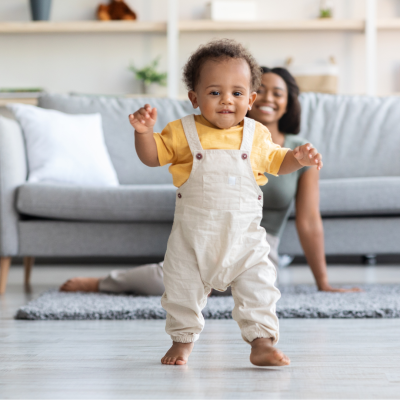When do babies start walking?

Do you know when babies start walking on average? Give it your best shot and get THREE extra entries to our Free Nike Baby Shoes giveaway! 3 extra entries could really help your chances of winning this great prize.
When Do Babies Start Walking? A Guide to Your Baby’s First Steps
Watching your baby take their first steps is one of the most exciting milestones in parenthood. But when do babies start walking, and what can you do to encourage this important stage of development? While every baby is unique, understanding the general timeline, signs of readiness, and ways to support their journey can help you navigate this exciting time.
When Do Babies Typically Start Walking?
Most babies take their first steps between 9 and 15 months, but the exact timing can vary widely.
- Early Walkers: Some babies begin walking as early as 8-9 months.
- Later Walkers: Others may take their first steps closer to 15-18 months, which is still considered normal.
Walking is part of a progression that begins with sitting, crawling, pulling up, and cruising (walking while holding onto furniture).
Signs Your Baby Is Ready to Start Walking
Before babies start walking independently, you’ll notice certain developmental signs:
- Pulling to Stand: Babies often start pulling themselves up on furniture around 8-10 months.
- Cruising: Once standing, they’ll begin moving sideways while holding onto furniture for balance.
- Improved Balance: As they get stronger, you may notice your baby standing without support for a few seconds.
- Increased Curiosity: Babies often try to reach new objects, motivating them to take steps.
How to Encourage Your Baby to Walk
While walking is a natural developmental milestone, there are ways you can support your baby:
- Provide Safe Spaces: Create a baby-proofed area where your child can practice standing, cruising, and eventually walking.
- Encourage Barefoot Time: Walking barefoot helps babies improve balance and strengthen the muscles in their feet.
- Use Push Toys: Sturdy push toys can offer support and build confidence. Avoid walkers with wheels, as they can pose safety risks.
- Offer Praise: Celebrate every small achievement, whether it’s standing for a few seconds or taking a single step.
When to Be Concerned About Walking Delays
It’s important to remember that every baby develops at their own pace. However, you may want to consult your pediatrician if:
- Your baby isn’t showing interest in standing or cruising by 12 months.
- They haven’t taken independent steps by 18 months.
- You notice signs of low muscle tone or stiffness that affects movement.
Tips for Supporting Your Baby’s Motor Development
- Tummy Time: Strengthen your baby’s core and neck muscles by encouraging tummy time during their early months.
- Interactive Play: Use toys or games to motivate crawling, pulling up, and cruising.
- Nutrition: Ensure your baby gets the nutrients they need for healthy bone and muscle development.
FAQs About Baby Walking
Q: Do babies need special shoes to start walking?
A: No, barefoot is best for new walkers. When venturing outdoors, choose soft, flexible shoes that mimic the barefoot experience.
Q: Is it normal for babies to skip crawling?
A: Yes, some babies go straight to walking without crawling. While crawling is beneficial for coordination, skipping it isn’t usually a cause for concern.
Q: How can I help a cautious baby who’s afraid to walk?
A: Offer plenty of encouragement and let them practice at their own pace. Holding their hands for support during early steps can boost their confidence.
Celebrate the First Steps with Joy
Walking is a monumental milestone, but it’s also just one of many exciting stages in your baby’s development. Whether your little one starts walking at 9 months or takes their time until 15 months or later, remember that each baby follows their unique timeline.
By providing a safe, encouraging environment and celebrating small victories, you’ll help your baby gain the confidence they need to stride into this new phase of life.
Looking for more parenting tips and milestones to watch for? Visit our website for parenting advice and free baby samples!